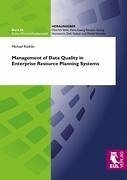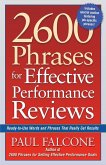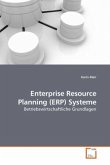On the one hand, Enterprise Resource Planning (ERP) systems promise to provide ¿all-in-one¿ application functionality to support business processes and to cover all the information needs of a wide range of organizations, from the operational to the executive levels. On the other hand, despite their success in the marketplace, ERP systems are exposed to a range of risks which endanger the quality of the data they process. In this research, the author assesses ERP design and implementation principles in light of data quality concerns, presents evidence from the field of daily ERP practice, and provides guidelines on how organizations can best handle data quality by integrating data quality considerations into existing ERP system implementation and business management models. The usage of general purpose data quality ¿add-ons¿ such as address edit controls is discussed in the context of ERP systems, and the role of dedicated master data management extensions ¿ handling data exchange between business partners ¿ is reviewed. Successful data quality management in an ERP context requires awareness, robust process design, and preventive measures. As the author shows, proven concepts described in the data management and (data) quality literature can be ¿ and need to be ¿ applied to the context of ERP systems, in order to fully exploit their potential.
Bitte wählen Sie Ihr Anliegen aus.
Rechnungen
Retourenschein anfordern
Bestellstatus
Storno








